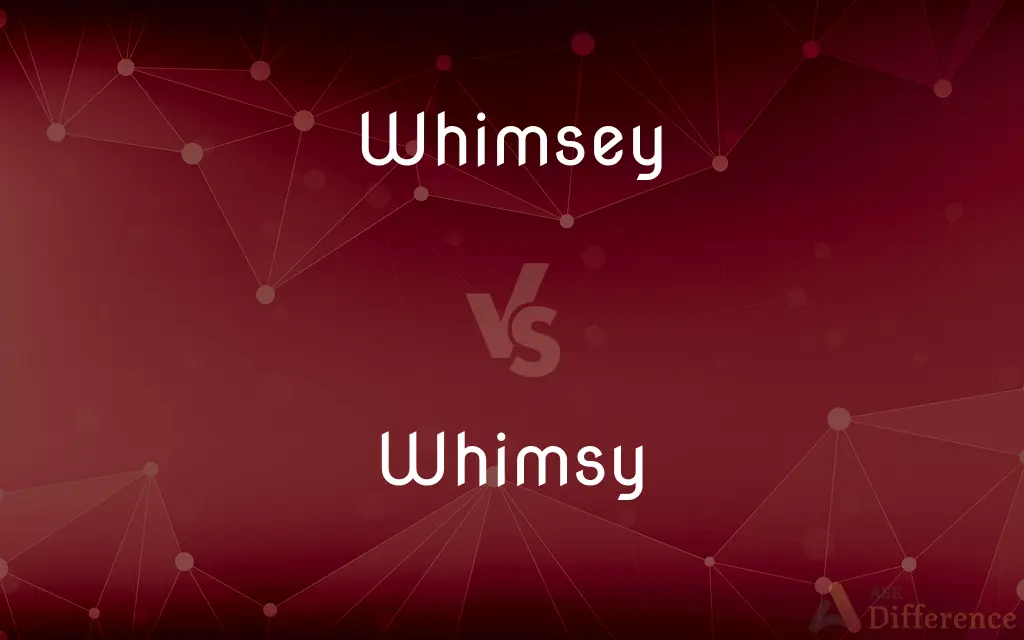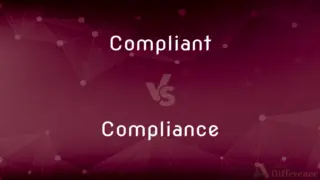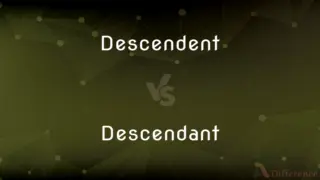Whimsey vs. Whimsy — What's the Difference?
By Tayyaba Rehman — Updated on October 7, 2023
Whimsey and Whimsy are alternate spellings of the same word, denoting capricious or fanciful behavior or ideas.

Difference Between Whimsey and Whimsy
Table of Contents
ADVERTISEMENT
Key Differences
Whimsey and Whimsy often lead to some confusion because of their incredibly similar meanings and spellings. In essence, they represent the same concept: a playful or fanciful idea or an unpredictable quirk. In modern American English, Whimsy is the more standard and commonly accepted spelling, while Whimsey is an older variant.
Both Whimsey and Whimsy relate to things that are light-hearted, unpredictable, or not always based in reality. They can describe an object, a piece of art, a thought, or even a person's behavior. For example, a piece of art that is playful or unconventional might be described as full of Whimsey or Whimsy. Both words emphasize a departure from the norm or the expected.
The prevalence of Whimsey vs. Whimsy can also be influenced by regional language preferences. While Whimsy has become the standard in most modern English dictionaries and publications, there might still be pockets where Whimsey is used. The difference isn't in their meaning but merely in their spelling and usage frequency.
In literature, especially older texts, you might encounter both Whimsey and Whimsy. While some authors might have preferred one over the other for stylistic reasons, both words were used interchangeably. Today, if one were to write formally or professionally, Whimsy would be the preferred choice due to its widespread acceptance and use.
Comparison Chart
Meaning
A playful or fanciful idea or behavior.
A playful or fanciful idea or behavior.
ADVERTISEMENT
Standard Spelling
Older variant.
More commonly accepted in modern English.
Usage
Less common today, might be seen in older texts.
Widely used in contemporary writing and speech.
Synonyms
Fancy, caprice.
Fancy, caprice.
Origin
Middle English, an alternative spelling.
Middle English, now the standard spelling.
Compare with Definitions
Whimsey
Something light-hearted or trivial.
The decor was a touch of whimsey amidst the formal setting.
Whimsy
Playful or fanciful behavior or thought.
The book was filled with tales of magic and whimsy.
Whimsey
An unpredictable or erratic action.
She wore the outlandish hat out of pure whimsey.
Whimsy
Light-heartedness or amusement.
She appreciated the whimsy in his jokes.
Whimsey
A capricious or eccentric idea.
The artist's installation was a clear reflection of his whimsey.
Whimsy
A quaint or unusual quality that's entertaining.
The playroom's decor was full of color and whimsy.
Whimsey
Playful behavior or humor.
Children's tales are often full of whimsey.
Whimsy
An odd or peculiar manner.
His way of thinking had a touch of whimsy.
Whimsey
A quaint or fanciful quality.
Her dress had a touch of whimsey with its playful patterns.
Whimsy
A thing that's unpredictable or capricious.
The whimsy of the weather made planning difficult.
Whimsey
An unusual, unexpected, or fanciful idea; a whim.
Whimsy
Playfully quaint or fanciful behaviour or humour
The film is an awkward blend of whimsy and moralizing
Whimsey
Quaint, fanciful, or playful humor
Stories full of whimsy.
Whimsy
A whim
A clean slate on which to enter information in the form that suits your whimsy
Whimsey
Alternative spelling of whimsy
Whimsy
An unusual, unexpected, or fanciful idea; a whim.
Whimsey
A whim; a freak; a capricious notion, a fanciful or odd conceit.
Men's folly, whimsies, and inconstancy.
Mistaking the whimseys of a feverish brain for the calm revelation of truth.
Whimsy
Quaint, fanciful, or playful humor
Stories full of whimsy.
Whimsey
A whim.
Whimsy
A quaint and fanciful idea; a whim; playfully odd behaviour.
Whimsey
To fill with whimseys, or whims; to make fantastic; to craze.
To have a man's brain whimsied with his wealth.
Whimsy
An impulsive, illogical or capricious character.
Whimsey
An odd or fanciful or capricious idea;
The theatrical notion of disguise is associated with disaster in his stories
He had a whimsy about flying to the moon
Whimsy can be humorous to someone with time to enjoy it
Whimsy
(mining) A whim capstan or vertical drum.
Whimsey
The trait of acting unpredictably and more from whim or caprice than from reason or judgment;
I despair at the flightiness and whimsicality of my memory
Whimsy
A jigsaw puzzle piece that has been cut into a recognizable shape, as if on a whim; often the shape is representative of the theme of the image used for the puzzle.
Whimsy
(transitive) To fill with whimsies or whims; to make fantastic; to craze.
Whimsy
A whimsey.
Whimsy
An odd or fanciful or capricious idea;
The theatrical notion of disguise is associated with disaster in his stories
He had a whimsy about flying to the moon
Whimsy can be humorous to someone with time to enjoy it
Whimsy
The trait of acting unpredictably and more from whim or caprice than from reason or judgment;
I despair at the flightiness and whimsicality of my memory
Common Curiosities
Can a person be described as full of Whimsey or Whimsy?
Yes, both terms can describe someone who's unpredictable, playful, or fanciful in behavior or thought.
Which is more commonly used: Whimsey or Whimsy?
Whimsy is the more standard and commonly accepted spelling in modern English.
Can an object be described as having Whimsey or Whimsy?
Yes, objects, especially art or decor, can be described as having a playful or fanciful quality characteristic of Whimsey or Whimsy.
Are Whimsey and Whimsy nouns?
Yes, both Whimsey and Whimsy are nouns describing a quality or behavior.
Do Whimsey and Whimsy have the same synonyms?
Yes, synonyms like "fancy" or "caprice" can be used for both Whimsey and Whimsy.
Which term might I encounter in older literature?
In older literature, you might encounter both Whimsey and Whimsy, as they were used interchangeably.
Is Whimsey considered incorrect?
No, Whimsey isn't incorrect, but it's an older variant and less common in modern usage.
Do both words have the same origin?
Yes, both Whimsey and Whimsy originate from Middle English.
Is Whimsey outdated?
While Whimsey isn't necessarily outdated, Whimsy is the more contemporary and widely accepted spelling.
Would I find Whimsey in modern dictionaries?
While Whimsy is more standard, some dictionaries might list Whimsey as an alternative spelling or older variant.
Are Whimsey and Whimsy the same in meaning?
Yes, Whimsey and Whimsy convey the same meaning of capricious or fanciful behavior or ideas.
Can Whimsey and Whimsy be used interchangeably?
While they have the same meaning, Whimsy is preferred in contemporary writing due to its standardization.
Can both terms be used in formal writing?
While both can be understood, Whimsy is recommended for formal writing due to its standardization.
How can I remember the difference between Whimsey and Whimsy?
Remember that Whimsy is the more modern and standard spelling, while Whimsey is an older variant.
Can Whimsey be considered a regional spelling?
While not strictly regional, Whimsey might be preferred in some older texts or by specific authors.
Share Your Discovery

Previous Comparison
Compliant vs. Compliance
Next Comparison
Descendent vs. DescendantAuthor Spotlight
Written by
Tayyaba RehmanTayyaba Rehman is a distinguished writer, currently serving as a primary contributor to askdifference.com. As a researcher in semantics and etymology, Tayyaba's passion for the complexity of languages and their distinctions has found a perfect home on the platform. Tayyaba delves into the intricacies of language, distinguishing between commonly confused words and phrases, thereby providing clarity for readers worldwide.














































